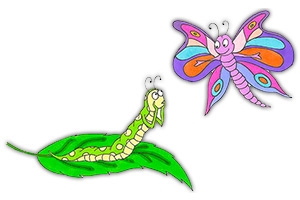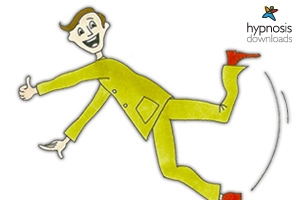How Do Your Critical Thinking Skills Measure Up?
Avoid the 5 most common thinking errors and develop your critical thinking
 Accurate critical thinking can be tripped up by several common errors.
Accurate critical thinking can be tripped up by several common errors.If you reckon your critical thinking skills are pretty hot, then consider this: There's a killer near you. It's closer than you think. Most of the time you don't give it a second thought; most people don't. It's been with you much of your life and killed the famous fabric designer Laura Ashley, as well as a woman my mother knew through work. What is this malignant killer lurking in our midst?
Stairs!
That's right, the humble but not to be entirely trusted staircase (1). In our risk-adverse times (ignore that statement if you're a banker), stairs would not be passed by 'health and safety' if they were a new idea.
Every year in the UK, around 1,000 people meet a premature end at the bottom of stairs (2). In 2007, 646 pedestrians were killed in traffic accidents in Great Britain. Crossing the road we, quite rightly, see as a risk. Racing down the stairs to catch your favourite TV show we don't. I've never been run over, but as a young child I fell down some stairs (and have never been the same since).
What's my point in all this?
We are all less straight-thinking than we like to suppose
Well, my point isn't to scare you into staying on one floor (remember the massive majority of us are not killed by stairs), but to illustrate how terrible we are at ascertaining risk. This is one major critical thinking error. Most of us underestimate some threats whilst grossly overestimating others.
Smokers will declare (with a look of wheezy desperation) that they're just as likely to get killed by a car (1 in 14,000 chance) as get killed by puffing their cigarettes (1 in 2 chance). En route to the airport, we nervously perform a more dangerous activity (driving) whilst getting anxious over the prospect of engaging in a much safer one (flying). We think we want facts, but we don't always respect them or seek them out.
Why do I think we should all think more critically?
Mr Spock or Chewbacca?
'Critical thinking' doesn't sound very sexy, and as someone said: "You can tell the genuine importance of something by correlating the general lack of interest in it." But being able to employ rationality when you need it (rather than pedantically always having to be laboriously 'rational' about everything) could mean the difference between life and death, happiness and misery, health and sickness.
Being able to think strategically, rationally, and objectively is a vital tool to be used alongside more direct, intuitive 'gut feelings'. But most of us are never taught how to think. We can all learn to think better by knowing what the more common critical thinking mistakes are, so as to avoid them as far as possible.
So what are the most common thinking errors that can cause so much potential human misery?
Critical Thinking Error 1: Faulty probability vs. possibility assessment
Okay, I think I've covered this one. The point to remember is that we are all pretty rubbish at properly assessing risk. I know someone who will not walk under a ladder through fear of bad luck, but will happily drive without a seatbelt! Just because winning the lottery, being abducted, dying in a plane crash, or meeting an honest politician is possible, it doesn't make them probable. This sounds like a small point; it isn't.
Pessimists, hypochondriacs, and people prone to jealousy all tend to believe something is probable, even inevitable, either because it's happened before, so they feel it's now more likely to happen again, or because they can imagine it happening, which to them makes it feel more likely to happen.
What to do: Don't always trust your imagination, because you can imagine anything. Get good at appreciating the sheer unlikeliness of some of the things you fear, whilst learning about the true statistical risks of other things. Knowledge is power.
Critical Thinking Error 2: Watch the either/or explanations
We don't think like Mr Spock off Star Trek, and we're not meant to. We all need emotion to influence our decisions, even when we are not even consciously aware that emotion is playing its part (3). But too much emotion can simplify our thinking out of all usefulness and perhaps cause us to lash out rashly like an enraged Wookiee. Some things are pretty black or white (like the colours), but much of life is best appreciated through more subtle assessments. For example: above I asked you, the reader: "Mr Spock or Chewbacca?" But is there no in between? No compromise? No Spock and Chewbacca? Being able to stop and see the shades of gray can help us assess reality more accurately and stay mentally healthier.
What to do: If you suspect you are being too all-or-nothing in your thinking, ask yourself: "What is another way of looking at this?" or "If someone were to disagree with the way I'm thinking, what might they say?" Learning to use self-doubt constructively can, paradoxically, make us more genuinely confident.
Critical Thinking Error 3: Assuming other people think like you
In psychology, 'theory of mind' means recognizing that other people have a separate mind from you, with different motivations and perceptions.
It's often said that a tiny child will assume everyone else sees the world from exactly their perspective (if she considers their perspective at all); a teenager will sort of know that other people hold differing ideas, but assume they're morons for doing so; and an adult will understand and make allowances for other people's perspectives. The problem being, of course, that a fifty-year-old man might be intelligent in many ways, but still have all the 'theory of mind' of a two-year-old, whilst a teenager may have understanding and perception beyond their years. Assuming other people are or should be just like us is a thinking trap.
What to do: Explore the idea that other people may have a different take on things and that you may even be able to learn something from their perspective - or at least learn about them by appreciating their view.
Critical Thinking Error 4: Proof by selected instances
We so easily forget the dictum 'the exemption that proves the rule'. A common thinking error is to assume that if something is or isn't true for you or someone you know, then it is or isn't generally true for most people. So if I say to someone something like: "You know most people clean their teeth before they retire to bed", they might come back at me: "Well, I don't agree because I don't and nor does my Aunt Beatrice (bless her cotton socks and fetid breath)". This seems crazy in this context, but if you watch out for it you'll see proof by selected instances all over the place. I said that I fell down the stairs as a child but have never (as I write) been run over by a car - it would be silly of me then to infer that deaths on the roads happen less often than death from stairs.
In behavioural economics, this is called 'the law of small numbers' (4), referring to people's habit of drawing over-confident conclusions from selected or too-small amounts of information.
What to do: Remember that there is a bigger picture and look for it.
Critical Thinking Error 5: 'Trance logic'
Trance logic happens when you've hypnotized someone and made a suggestion (such as: when they awake, they'll feel compelled to open a window when you cough). If you ask them why they opened said window, they may look at you strangely, then give you a perfectly plausible explanation as to why they opened it that doesn't include the fact that you asked them to whilst they were hypnotized. This use of 'hindsight bias' isn't lying, but it is a way of missing the truth - and we all do it, whether we have been hypnotized or not.
We like to have narrative to events - to make stories and have clear reasons for why we and others do or did things. Hindsight bias or 'trance logic' is a way of artificially, but in good faith, assigning a false story to a random sequence of events.
What to do: Remember that not everything needs to be analyzed and put into a narrative and that making up a story about how you reached a current position may make you feel better, but may also be destructive. This isn't a small point, either. Hitler used trance logic to explain away the problems in 1930s Germany by blaming it all on the Jews. This 'narrative' or 'trance logic' cost millions of lives.
So being able to suspend judgement, see the bigger picture, and think rationally are, I believe, vital to human happiness if coupled with compassion and other facets of 'emotional intelligence'. In fact, unless we can all learn to think more critically, the human race may be in for some very rocky times indeed.
References
- I have to admit I borrowed the idea for this rather dramatic intro from John Lanchester, writer of the fabulous Whoops!: Why everyone owes everyone and no one can pay.
- According to the Government's mortality statistics.
- As an example of how important emotions are in life, there's a famous case of a patient known as Elliot who had a benign tumour removed from his brain, along with some of his prefrontal lobes. Soon after the operation, he began to notice changes in his life. Before the operation, Elliot had been a successful businessman; but he soon began making such poor decisions at work that he lost his job, and then his wife, and his life effectively disintegrated. Yet Elliot himself seemed quite indifferent to all of this. It was very difficult to prove what was wrong with Elliot, and in all memory tests and cognitive tests he came out fine. Eventually a neurologist called Antonio Damasio came up with an explanation: Elliot had lost the connection between his emotional brain and his thinking brain. He effectively no longer felt emotions. Instead of this making him a perfectly rational Spock-type character, he became incapable of making any decisions at all. Even when booking an appointment to see Damasio, Elliot would be able to list the pros and cons of various times, but he had no preference, because he didn't know how he felt. Things have to feel right as well as appear logical for us.
- A term coined by Nobel Prize-winning economist Kahneman and his colleague Tversky.






